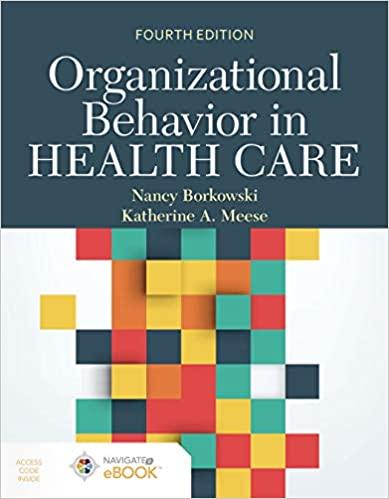Alice has been a business/finance trainer for MGM Healthcare Consulting Groups clients for 3 years. Until recently,
Question:
Alice has been a business/finance trainer for MGM Healthcare Consulting Group’s clients for 3 years.
Until recently, she enjoyed her job responsibilities and coworkers, and although she would like to earn more money, she believes that her salary is fair compensation for her duties, experience, and education.
Alice’s first career choice was to be a teacher, so she especially likes the ability to teach others about her second passion: the business side of health care. She has an MHSA degree, certification as a health care finance professional through HFMA, and a lean Six Sigma Green Belt. Alice has been recognized by her director for her excellent work each year.
As a trainer, Alice needs to travel extensively 8 months of the year to clients’ facilities throughout the United States. During this period, Alice works 12-hour days, 6 days a week. During her nontraveling months, Alice is in the office preparing new training manuals and conducting educational webinars for existing and potential clients. During this period, she works three and half days a week but collects a full paycheck. Alice has been fine with this schedule because she enjoys what she does and she feels that, in the end, it all balances out. Also, although she has never requested time off during the traveling months, her director has said that she would cover for Alice if the need arose.
Just as Alice’s latest traveling period began, she found out that her mother will need surgery next month, which will require a 2-day hospital stay and complete bed rest for a week. Alice’s father is available to help with the situation, but Alice and her mother are very close, and Alice wants to be there to take care of her mother while she is recuperating. Alice tells her director immediately about her family situation, but her director refuses to accommodate her request, telling Alice that because the office is short staffed, there is no one to cover her clients’ training requirements during that week. Alice becomes frustrated and angry because she has never asked for time off during her traveling period, and now she will not be able to help her mother.
Another issue that has frustrated Alice from the beginning is how her director micromanages her and other coworkers when they are in the office during the nontraveling period. All changes to the training manuals, the content of the educational webinars—essentially everything—has to be approved by the director before it can be finalized. This has caused deadlines to be missed, resulting in client complaints.
Alice feels that this affects her reputation with existing clients in addition to affecting the bonus money she would have received for signing up new clients to participate in the educational webinars. She has also felt frustrated with the lack of growth opportunities within the consulting company. The organization is small, so after working for the company for 3 years, she has already reached the top position and pay scale below the director level.
Although Alice enjoys working with her clients and coworkers, she has become dissatisfied with her job and no longer feels committed to doing whatever it takes to get the job done. She is starting to resent having to give up her weekends for 8 months of the year, her director’s delays that cause her to lose bonus money, and the lack of growth opportunities. She doesn’t know how much longer she can continue working for MGM Healthcare Consulting Group.
Using Porter–Lawler’s Satisfaction–Performance Theory, discuss Alice’s job dissatisfaction and lack of motivation.
Step by Step Answer:

Organizational Behavior In Health Care
ISBN: 9781284183245
4th Edition
Authors: Nancy Borkowski, Katherine A. Meese





